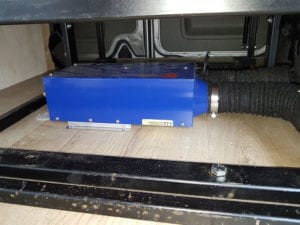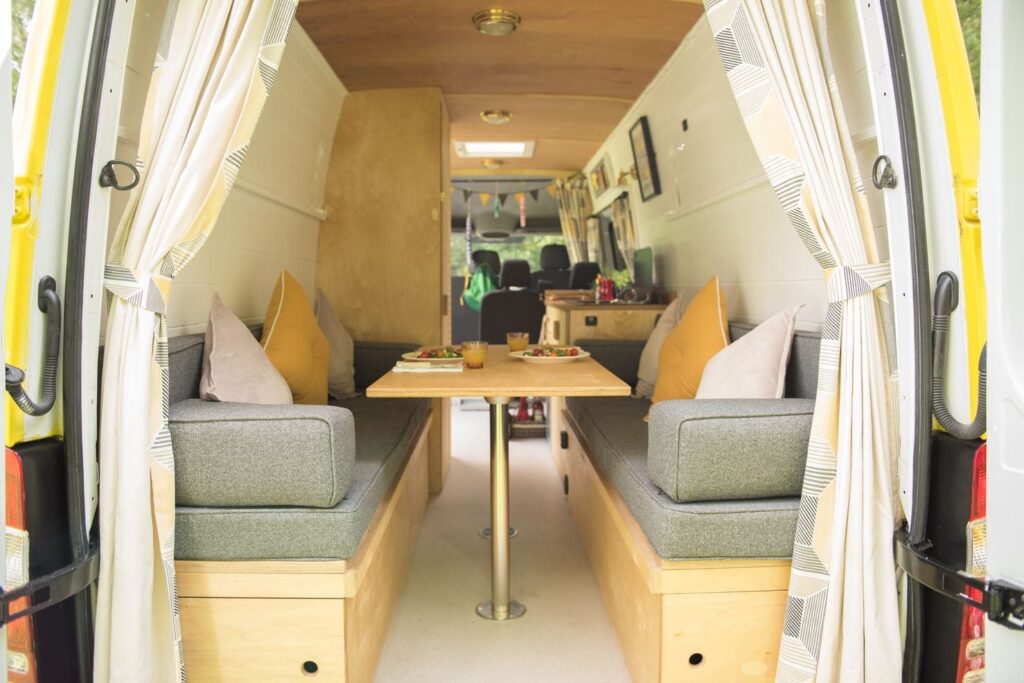Home » Try Before You Buy – Why Hiring a Campervan Could Save You Costly Mistakes
Try Before You Buy – Why Hiring a Campervan Could Save You Costly Mistakes
Are you looking to buy a campervan? Or convert one yourself? Here Laura and Naomi, owners of Quirky camper Wanda, make the case for why it’s essential to try before you buy. If you’re already convinced you want to buy a campervan, read our guide to help you decide whether to self build, buy your own or commission a professional. Or if you’ve decided to buy one already converted, head straight to our campervan listings page.
I’ve always found it quite bewildering that two of the largest purchases (both in size and cost) during our lifetime are also often the ones we have the least opportunity to thoroughly test out or consider before we part with our cash.
Cars, for example, a cost of thousands of pounds merrily signed away after spending probably the grand total of 4 hours with a sales exec, sometimes not even going on a test drive!
I recall purchasing our house, walking in it and saying “yes, this one, I want this one” and some lots of money later I’m a home owner with a life of debt in front of me!
Shoes, on the other hand I will happily spend hours researching on the internet before trawling around shops trying on both the ones I want, plus a few comparison pairs to make sure I really want them, then making sure I can’t get them cheaper elsewhere, thinking about it over a coffee before maybe, if I’m feeling spontaneous enough, making a purchase!
It makes sense to me, therefore, to put campervans in the same category as shoes and avoid ending up with an unsuitable vehicle for your lifestyle just because you fell in love with a Pinterest version of it online.

As with shoes (it’s a good analogy, and I’m sticking with it) it’s a good idea to start off asking yourself a load of questions about why you want a van, and what you’re going to do with it. The answers to which will quite probably rule some options out. Fundamentally, until you actually spend time in a van getting a feel for its practicality and you don’t know how you will use it. For example, you might really like the idea of wild camping so go ahead and get a van with no toilet and no shower but then the first time you face the reality of a warm shower outside your van with a very specific amount of water, you might change your mind! I mean, we all have experience of buying that perfect pair of shoes that match the outfit exactly and they feel fine in the shop, only to spend the entire night out sat down because even the thought of dancing makes your feet feel as though you’re plunging them into a fire shoe that’s 3 sizes too small. Best to avoid if at all possible.
Here are some questions I would recommend you asking yourself and, you might find that in order to answer them, it’s worthwhile putting in the effort to answer them with a bit of first-hand experience.
How often will I be using the van?
Are you a weekend warrior or in it for the long haul? If you plan on getting away from the 9-5 at every opportunity you have, no matter how short its duration, then a pull-out bed with a larger social, living and eating space is probably a good option. Vans of this ilk tend to be smaller which makes driving and parking them slightly easier and they are kinder on the pocket in terms of fuel. You might also be able to integrate more bespoke or quirky features if you don’t need your van to be a complete homage to practicality e.g. a roof rack that turns into a bed for star gazing, a wine bar in the corner, or an internal hammock! You might have to trade out internal toilets and showers for storage space and sacrifice larger water tanks but you’ll have the perfect pack up and go vehicle to hit the road on a Friday night with a bottle of wine and your hiking boots.

If, on the other hand, you have the luxury of longer term adventures or you’re travelling further afield then a larger van gives you the very wonderful option of a fixed bed which can be a blessing when you’ve arrived back at your van from a long day out on the mountains, or the pub….

Inevitably you’ll end up with more storage space which makes the quandary of “which shoes shall I pack” (again with the shoe analogy) a moot point – take them all! You can supersize your ideas as well as your van, so the installation of toilets, showers, ovens, more berths and more seating gets a lot easier. It’s worth considering though, that all that space and those facilities need heating and feeding so you’ll have to install and maintain a larger water tank and heater and think very carefully about the type of heating you intend to use.
What type of heating should I have?
The answer to this question is closely linked to when you’re going to use your van. If you’re not planning on braving a Scottish winter or venturing oversees to seek snow then you may well be able to save your pennies on any sort of installed heating at all and, instead a portable gas heater may do the trick. If, however, if you eagerly get out your ice axes at the vaguest whiff of a flake of the white stuff then you have the following main choices:
Woodburner: These are really cosy and are a quirky feature to have a in a van. They produce a dry heat so produce less condensation than gas heating. The downsides are that they take up valuable room, you also need somewhere to store wood and they can be a little smelly. You can also kiss goodbye to dreams of being stealthy with a smoking flue on the roof!

Gas heating: Propex blown air heating is by far the most popular way of heating a van. It offers virtually instant heat which is temperature controlled and is extremely cheap to run – we’ve been in Wanda for a week in blizzard conditions (OK, read really cold and fairly constant snow) running the heating pretty full on and it cost approximately £2.75! The downsides are it can be a little noisy when it’s on though you soon get used to it and you can buy a muffler, plus it’s a wetter heat than a woodburner meaning more condensation.

Diesel heating: These are an excellent choice in terms of the availability of the fuel to refill and the speed in which it will heat your van. But, they are typically less reliable, require more maintenance and on the whole are far more expensive to run.

Candle and a plant pot…….. google it, go on! ;p
How tall am I?
I’d follow on this question with “do I enjoy doing everything sitting down?” I’m 5ft4 (and a little bit) and even I couldn’t contemplate a non high-top van. It’s evidently not for the danger of hitting my head when standing up, more for the feeling when inside the van. We have a Renault Trafic which is on the smaller scale of vans and the difference between being able to stand up to get dressed, to cook, even the roominess when sitting chilling out means that I don’t feel like we have a smaller van and I’m perfectly happy to spend weeks at a time in her.

Sometimes we can’t get in to car parks which initially was a frustration. But now, we drive a little further and we walk a little longer and we usually end up parking for free. It’s not a big deal.

I would say this is probably one of the most important considerations when buying a van and it’s a very good idea to try out both options before you part with any money. You might find the perfect middle-ground is having a pop top roof but again this has its pros and cons.

Am I legal?
It sounds silly, but unless you passed your test before 1997 you are restricted to the size and weight of the vehicle you can drive, which is 3.5 tonne. Remember this is laden weight so if you’ve got a van on the edge, you need to really think about the materials you’re going to use in the conversion as well as how much stuff you’re going to bring along on the journey! Taking your van to a weighbridge is highly advisable to avoid hefty fines.

Do I have any friends?
A large part of camping and vanning is about the solitude but, chances are at some point you might want to share your view with another living person or, you might need your van to accommodate your children, three dogs and a chicken (we’ve seen it on Instagram….)
If you’ve got a horde of happy campers in tow then you’ll probably need a larger vehicle and you’ll need to consider how the seating will work to safely and legally transport everyone. If you only get an occasional visitor for a sleepover then something that works really well is keeping the bench seat in the cab to accommodate two passengers and slinging a small tent in the back – you don’t necessarily have to cater for occasional occurrences on a permanent basis at the detriment to your own more frequent use.

This also bears relevance to the type of cooking facilities you have – if you’ve got a lot of people to cater for then you might need more than two hob rings and you might well need a decent sized fridge. Wanda has a cheeky little top loading corner fridge which happily takes a week’s worth of food in one hit including wine!

Do I even need to buy a campervan?
A quality conversion is going to set you back a minimum of £15k (and it could be much more depending on the functionality you want. Factor in a couple of grand a year for insurance, MOT, tax and maintenance and you need to be using it a LOT to make it worth owning over renting when you need one. As a (very) rough estimate, if you’ll be using it more than 6 weeks a year you are getting into the zone where it might be more cost-effective to buy a campervan.
It’s also worth thinking about whether you have somewhere to store it and enjoy maintenance and upkeep? Or would you prefer to pick up a sparkling clean, well-maintained van and drop it back when you’re done?
In conclusion
The list could conceivably go on and on with what if this and what about that. A van is, arguably, a more difficult thing to pin down than a daily car or even a house because you’re asking it to do so much, to have so much functionality in a significantly reduced space.
Plus, there’s no denying they’re expensive! So, trying before you buy a campervan is a really good way to learn from someone else’s ideas, to experience something you might not do and learn from the mistake before you make it!
It’s a bit like speed dating except, we recommend you take it slow, pick a couple of vans, go on a couple of awesome adventures and then be confident you’re making the right choice when you embark on the adventure of your own making.
 Glastonbury 2025:
Glastonbury 2025: 



